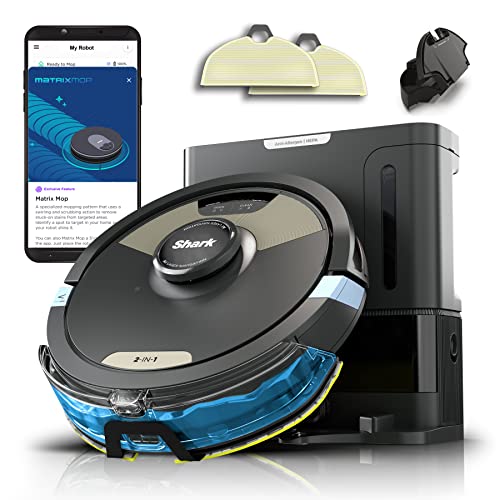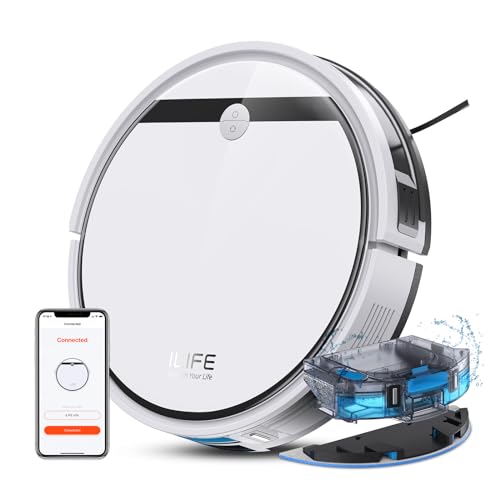Why Robot Vacuums Is Your Next Big Obsession
페이지 정보
작성자Deon Fisher 댓글댓글 0건 조회조회 46회 작성일 24-02-18 01:00본문
 The Benefits of Robot Vacuums
The Benefits of Robot VacuumsRobot vacuum cleaners typically need less maintenance than traditional vacuums. They do need to be regularly emptied (and rinsed when the manufacturer suggests it) and wiped to remove hairs from their brushes.
 Look for models that have smart mapping features that show you a virtual map of your home, and models that let you create no-go zones. Think about models that distinguish between pet hair and dirt if you own pets.
Look for models that have smart mapping features that show you a virtual map of your home, and models that let you create no-go zones. Think about models that distinguish between pet hair and dirt if you own pets.They're more efficient
If you're someone who has little time to clean and maintain your home, then a robotic vacuum is a good investment. They can't replace an upright or a canister cleaner, but they will reduce the amount of dust and debris that accumulate in your home. They also help reduce allergens and bacteria. They tend to be quieter than traditional vacuum cleaners however, they still require a certain level of maintenance.
Many robotic vacuum cleaners come with filters that need to be cleaned regularly. You'll also need to replace the batteries. Certain models also come with HEPA filters that can capture smaller particles of dirt and dust and can reduce allergies. These filters must be changed every three to four cycles, or as suggested by the manufacturer.
One of the most common concerns people have with robot vacuums is that they could fall down the stairs or harm their walls or other furniture items. These fears are not true, as most models are programmed to be allowed into certain areas of the house and can create virtual walls that prevent them from entering restricted areas.
Most robot vacuums come with sensors that recognize the type of flooring and adjust the settings accordingly. This lets them clean a variety surfaces, such as carpet, wood and tile. They are able to detect obstacles and stairs, and will automatically change their direction when they come across them.
The methodical back-andforth cleaning motion that robots rely on helps ensure that all the nooks and crannies of your home are cleaned. Certain models can be used as robot mops. My experience with mopping capabilities of these machines has been less-than-stellar.
They're more comfortable
Contrary to traditional vacuum cleaners that require you to plug them into an outlet, robots are completely cordless and operate completely on their own. They're typically quiet, so they won't wake you in the late at night, and some can even be scheduled to clean when you're away from your home.
The majority of robots are smaller than a stick vacuum, meaning they take up less space in your home. They are easy to store in a closet or under your bed and even carry them from room to room.
Certain robots come with self emptying robot vacuum-emptying features which means that you don't have to empty the trash bins manually after every cleaning session. And if you have a bob robot vacuum that can mop, it will typically come with a large water tank that can last for months without needing be empty.
The machines utilize sensors to detect any changes in the floor's surface, and automatically adjust their settings to achieve the most effective results. This eliminates the necessity of choosing between hardwood, carpet or tile and lets them complete the cleaning of your home in a single session.
The back-andforth motion they employ is similar to the way people move when cleaning a room, which ensures that every corner and crevice is adequately covered. Advanced models can also use lasers or cameras to create real-time maps of your home, so they can navigate around furniture and other obstacles.
Most robots are able to recharge themselves, then return back to the charging base to replenish their batteries when needed. This lets you take your time with other things, or do things you enjoy in your spare time. You can control your smart home devices with a smartphone application, since they are connected to Wi-Fi.
It's important to remember that robot vacuums are more expensive than a standard stick vac, and they don't come with the same guarantees as conventional appliances. They typically have a a warranty of one or two year which isn't very long.
They're more flexible
The allure of a robot vacuum cleaner is that it performs the cleaning without interference from the user. There's no cord to wrangle or hose to deal with, and you can operate the device using a remote control or apps for your smartphone. A lot of them can be programmed to wash themselves, making them ideal for hands-free cleaning.
If you own an intelligent home device such as Amazon Alexa or Google Assistant, you can also control robot vacuums by voice commands. This can make it easier for those who are elderly or limited in mobility to utilize them. Certain robot vacuums will map your floor plan and you can choose the rooms you want cleaned using an app or voice command.
In contrast to upright, canister or handheld vacuums that have cords that must be constantly removed from the way or get stuck in electrical wires robots run on batteries and don't have to be physically connected and unplugged from room to room. They're generally quieter too with some operating at the same level of sound as a refrigerator. This makes them ideal for homes with a lot of sensitive people, especially those with pets or children terrified of traditional vacuums.
Another benefit of robot vacuums is that they typically require less maintenance than conventional machines. They don't have cords or hoses to manage, and they're usually smaller and require less space to store. Most models have a dirt bin or bag that needs to be emptied frequently and the brush rollers also need to be cleaned frequently. In general,, robots are only effective when they're switched on and placed inside the room which they're designed to clean.
Robot vacuum cleaners aren't free of shortcomings. One of the biggest disadvantages is that they cost more than other vacuum cleaners. They can also be slow in their completion than traditional models. And while most robots will not fall down the stairs or knock over your furniture, they are still susceptible to clogging and getting stuck.
They're more expensive
Robots can be quite expensive, especially when you go for the latest models with advanced features. However, if you're willing to spend a bit more, it's possible that a premium model can save you money in the long in the long. Budget robo-vacs, for instance, have smaller dustbags and brushes that require replacement more frequently than their more expensive counterparts. This adds up over time and can increase the total cost of ownership.
In addition, models that are less expensive tend to have short warranties and are more likely to malfunction and break down more than their premium counterparts. Another hidden cost is the requirement to replace motors and batteries or make repairs.
Premium models are stocked with a variety of innovative features, making them more efficient and dependable than conventional vacuums. Features like advanced navigation, object recognition, and mopping are now standard among robot vacuums. It is also evident that the more expensive models come with a larger battery capacity, a longer lifespan and are constructed with higher quality materials.
Robot vacs may be great for general cleaning, but they're not a magic wand. Based on the model you select, the robot vac may struggle to get into corners or clean flooring with textured edges. In these situations it is recommended that you have adult supervision and a thorough manual deep cleaning are necessary.
Aside from this robot vacs are excellent in cleaning a variety of surfaces, including floors that are not bare carpet, hardwood floors and Linoleum. They can also be programmed to clean at specific times via a smartphone application which is a major benefit for homeowners who are busy. But they're not an alternative to a mop or vacuum, and you should still maintain your home by regularly mopping and sweeping. A high-quality mop with microfiber pads and a bucket of water will ensure you get the Best robot vacuum for thick Carpet (o80b27Ibxncian6alk72bo38c.kr) results from your robot vacuum.
댓글목록
등록된 댓글이 없습니다.
